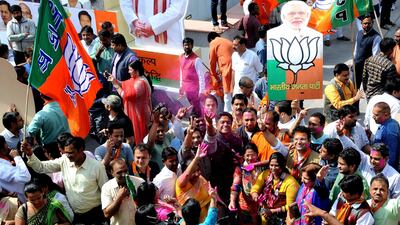By coming to power in two north-eastern states on Saturday, Prime Minister Narendra Modi's Bharatiya Janata Party has strengthened the prospect that it may come to rule every state in India.
In Tripura, a state where the BJP previously had no seats in the assembly, the party won 35 out of 59 seats, ending a 25-year reign by the Communist Party of India (Marxist). In Nagaland, the BJP won 12 out of 59 seats, but it will still form the government with its ally, the Naga People’s Front, which won 27 seats.
Only in Meghalaya, where election results were also announced on Saturday, did the BJP come a cropper, winning two out of 59 seats.
But the BJP’s strong performance in a part of the country that has traditionally been a stronghold for the opposition Left and Congress parties indicates how thorough Mr Modi’s domination of Indian electoral politics has become.
“The BJP today is perhaps the most formidable election machine that this country has witnessed in the last 70 years,” Yogendra Yadav, a New Delhi-based political analyst, said.
The BJP now rules, either by itself or with a partner, 21 out of 29 Indian states - the highest such proportion since the Congress was in power in 18 states a quarter of a century ago. As India prepares for parliamentary elections next year, these wins will lend the BJP further momentum.
The north-east has, by and large, remained indifferent to the BJP’s traditional emphasis on Hindu nationalism, or Hindutva. Roughly 90 per cent of Nagaland’s population, for example, is Christian. Tripura is a majority Hindu state, but a third of its population consists of indigenous tribes.
Some of these tribes are Christian; others practise a variety of Hinduism very different to that in the BJP’s heartland of north India.
For a Hindu nationalist party like the BJP to win over these electorates was “surprising,” said Pradip Kumar Datta, a professor of political theory at New Delhi’s Jawaharlal Nehru University. “It’s a major achievement, no doubt about that.”
The BJP secured this performance, in part, by subsuming Hindutva during the election campaigns, said Anindya Sarkar, who teaches politics at Tripura University, and who was a polling observer in the state during the election.
_______________
Read more:
Modi's party manages to hold on to his home state
Modi is penalising the elderly and middle classes with his new tax
Indian PM Modi's party predicted to win key state despite economic discontent
_______________
"Since last year, they've been making it clear here that, for example, they will not be talking about cow slaughter or try to regulate beef consumption," Mr Sarkar told The National. In contrast, in northern states such as Uttar Pradesh and Rajasthan, the BJP has, frequently and with great success, emphasised its stance against cow slaughter, since cows are sacred to Hinduism.
But since the diet in north-eastern India relies far more on beef, the BJP chose to soft-pedal the issue, Mr Sarkar explained.
Instead, the party’s focus during its electioneering has been on jobs and economic development. “Tripura, for example, has an unemployment rate of around 22 or 23 per cent, one of the highest in the country,” Mr Sarkar said.
This resonated particularly in the tribal districts of his state, he added. The previous Communist government had streamlined land ownership rights for the tribes, but it had failed to deliver any subsequent reforms.
“So they have land, but it stopped there,” Mr Sarkar said. “There was no irrigation, no seed banks, no agricultural loans.” The people of the north-east, and in particular the youth, “are very aspirational, and Modi came here and promised to create that kind of wealth.”
Mr Datta also observed that the BJP had been canny in stitching up local alliances. In Tripura, it partnered with the Indigenous People’s Front of Tripura, which was influential in the state’s tribal areas; in Nagaland, it teamed up with the Naga People’s Front.
“These were very intelligent moves,” he said.
But while these tactics won the BJP power in the short term, Mr Datta pointed out, they would also lead to an increased tension in the long term.
“Hindutva is the very strong basis of the BJP, and at some point this is going to lead to a crisis here,” he said.
The Hindu nationalist core of the party is likely to assert itself, and to clash with the other local identities of these states, whom the BJP has just won over, he predicted. These clashes may even result in communal riots, he said.
“I don’t know how that will resolve itself except through violence. I hope that doesn’t happen, but that isn’t something we can leave out of the reckoning.”

